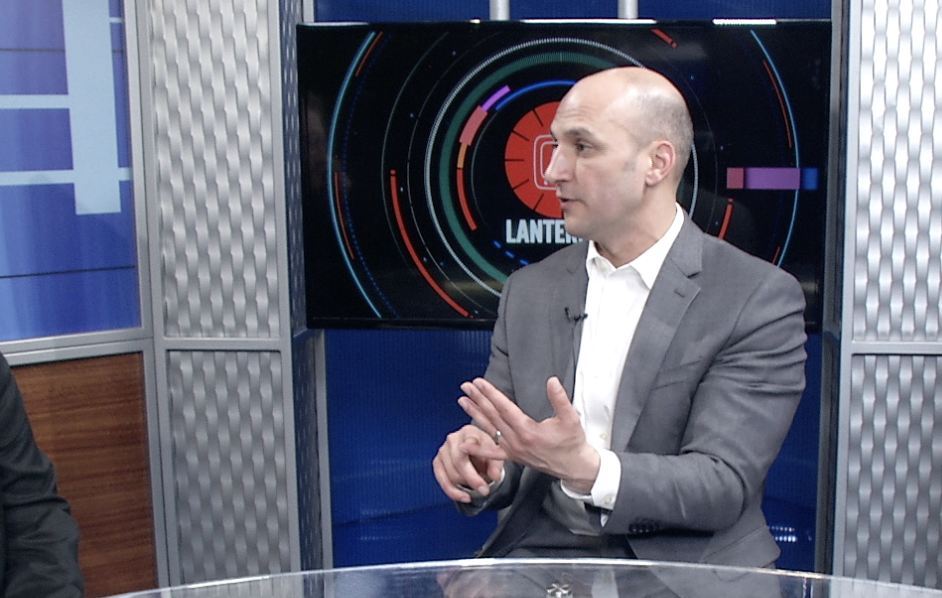
Joe Schiavoni sits down with the Lantern for an interview about his candidacy for governor on Wednesday March 21. Credit: Ashley Nelson | Station Manager
Joe Schiavoni recognizes that he is in a Democratic race with big-name candidates, but he’s OK with that because through the primary, he is garnering a reputation for being different.
“I’ve been earning it,” Schiavoni said. “I traveled the state, and I talked to people. I brought their voices to the statehouse. I knew that there were going to be candidates that had higher name recognition than me, but I also know that I can feel this wave coming and people just want something new and different, but they want somebody new, different and good.”
Schiavoni, an Ohio Senator who represents part of the Youngstown suburbs is running in the Democratic primary for governor against household names in Ohio politics such as Richard Cordray and Dennis Kucinich.
Schiavoni sat down with The Lantern for an interview last week to talk about his candidacy, an offer extended to all campaigns from both major parties. Schiavoni was the only campaign to respond.
Schiavoni said he wants to represent a candidate in ways unlike other politicians.
“It’s not different just because we want something different. [Voters] tried that with Trump,” Schiavoni said. “They want someone that actually understands issues, understands people, cares about people and is willing to put in the work.”
Schiavoni stressed the work he has been doing since he originally came to Columbus as an appointee to the state senate in 2008, a move he said came with no prior political ambition or agenda — just a desire to work with whomever he could on issues that matter.
“I just came down with an open mind, came down with a work ethic, came down knowing the things I understood about Youngstown, and I tried to work with everybody immediately,” Schiavoni said. “That’s how I still do it 10 years later.”
Schiavoni said his college visits are an example of going beyond the typical politician’s duties. He said many lawmakers briefly go to campuses to try to rally students during campaigns without actually listening to them.
“You got to talk to students about what’s really going on in their lives, and what I hear students talk about is student debt and opportunities when they graduate,” he said.
One of the major issues he works with that is relevant to students is college affordability and debt.
Schiavoni has laid out a plan that could impact college students similar to Maryland’s College Affordability Act of 2016. In Schiavoni’s vision, Ohio would implement an income tax credit for the purpose of student debt relief.
“At the end of the day we are going to have students that graduate with debt and we’ve got to figure out a way to help them deal with it,” Schiavoni said.
Another relevant school issue, especially after this weekend’s marches aimed at gun policy reform, is whether to arm teachers with guns to protect students in the classroom.
Schiavoni sides with most of his Democratic counterparts and does not want armed teachers in schools, but he said he he is not looking to enforce his views on local communities that feel differently, including Ohio communities that have already taken steps to arm teachers. Close to 30 Ohio school districts include controversial staff training to handle firearms in their security plans.
“The law currently says that the locals have the ability to make that decision. I don’t want to take away the locals’ ability to make that decision,” Schiavoni said. “I don’t think it’s a good idea. I don’t think that arming your teachers is the way you are going to protect your kids.”
Schiavoni’s larger stance on guns stops short of calling for some of the more heavy-handed measures.
He has not called for a ban on “military-style” assault weapons but said, “at the end of the day we have to figure out if we want people to have military-style weapons in communities.”
Schiavoni will continue to travel the state, like he has done for the last year and a half, as the primaries continue to come to a close with voting on May 8. While it might seem like he has little chance of winning the primary, he said he’s determined to continue fighting, an approach he said he uses every day in his work life.
“I take that approach to this job everyday,” Schiavoni said. “You get up and you do it until you sleep and you just keep working through it and you reach people and you talk to people about what’s important to them.”
![The Lantern reached out to Ohio State students to hear their opinions on the outcome of the presidential election and what issues most influenced their vote. Credit: Win McNamee/Getty Images via TNS [Original caption: Republican presidential nominee, former U.S. President Donald Trump and Democratic presidential nominee, U.S. Vice President Kamala Harris greet as they debate for the first time during the presidential election campaign at The National Constitution Center on Sept. 10, 2024 in Philadelphia, Pennsylvania.]](https://www.thelantern.com/files/2024/10/US-NEWS-CAMPAIGN-LATINOS-GET-384x253.jpeg)

